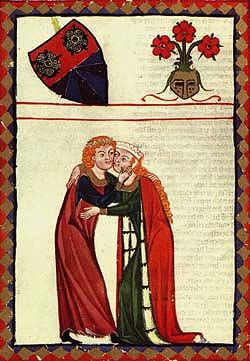Wednesday
Among poetry’s many gifts to the world is St. Valentine’s Day. In Parliament of Fowls, Chaucer took marriage, which in the Middle Ages was a business affair, and joined it with the courtly love tradition, giving the holiday the aura that continues to this day. Write for the marriage of Richard II and Anne of Bohemia, Parliament of Fowls describes the goddess Nature pairing up all the birds:
For this was on St. Valentine’s Day
When every fowl comes there to choose his mate
Of every kind…
And that so huge a noise the birds do make
That earth and sea and tree and every lake
So full it was that there was hardly space
For me to stand so full was all the place
The poem is a dream vision, with the poet at first loathe to enter the garden because of the second of two signs posted on the gates. While the first promises the pleasures of love, the second points to love’s torments:
Sign 1
Through me men go into that blissful place
Where hearts are healed and deadly wounds are cured;
Through me men go into the well of Grace
There green and lusty May shall ever endure;
This is the way to all good adventure
Be glad, thou reader, and thy sorrow off-cast
All open am I; pass in, and speed thee fast.
Sign 2
“Through me men go,” thus spoke the other side,
“Unto the mortal wounding of the spear,
Of which Disdain and Danger is the guide,
There tree shall never fruit nor leave e‘er bear.
The stream shall take you to the sorrowful weir
Where as the fish in prison is all dry;
Escaping is the only remedy.”
Chaucer is fearful until his guide assures him that, because he himself is not in love, he has nothing to fear. He can simply watch other people experiencing love’s highs and lows.
Upon entering he encounters a beautiful garden:
A garden saw I, full of blossomy boughs
Upon a river, in a bright green mead,
There as sweetness evermore enough is,
With flowers white, blue, yellow, and red,
And cold well-streams, nothing dead,
Filled with fishes swimming small and light,
Their fins were red, and scales were silver bright.
On every bough the birds heard I to sing,
With voice of angels in their harmony;
Some busied themselves with more birds forth to bring;
The little coneys to here play did hie,
And further all about me I could see
The dread-filled roe, the buck, the hart and hind,
Squirrels and gentle beasts of every kind.
Of instruments of strings all in accord
Heard I so play such a ravishing sweetness,
That God, that creator is of all and lord,
Had heard never better, I must here confess.
Therewith a wind, it could be nothing less,
Made in the green leave a nose so telling soft
As to the ears the fowls’ song came.
In this garden he sees many of the mythological gods, including Cupid, Venus, Bacchus, and Priapus, a male fertility god marked by oversized genitalia. There are also ladies dancing, one lady without any clothes, and youths disporting on the green. The real drama of the poem, however, involves the birds.
The goddess Nature is there to make sure that everyone pairs up, but the other birds have to wait as three royal hawks argue over who should marry the lady hawk. Since a royal wedding must precede all others, the birds begin to get restless and start complaining. To break the impasse, Nature hands the decision over to the lady, who decides to wait a year. Thankfully, Nature doesn’t force the other birds to wait but allows them to get on with it:
And when this work was brought unto an end,
To every fowl Dame Nature gave his mate
By even accord, and on their way they went.
Ah! lord! the bliss and joy that they did make!
And with their necks each gave the other wynde [embrace],
Thanking always the noble goddess kynde [nature].
The poem concludes by invoking St. Valentine and promising that winter will end:
Saint Valentine that has been set on high
Thus sing the many birds all for thy sake —
Now welcome summer with the sun in sky
That hast this wintry weather over-shake.
Joy to you as you celebrate or search for your own bird.


